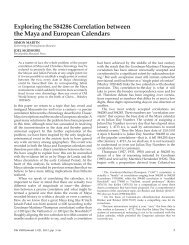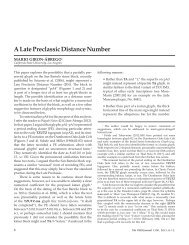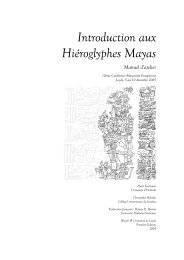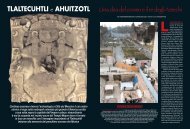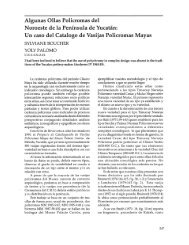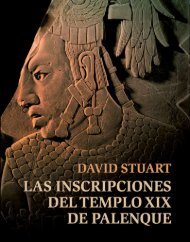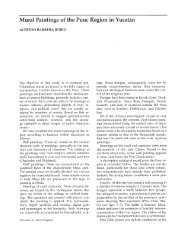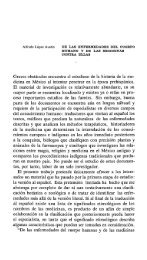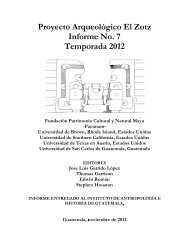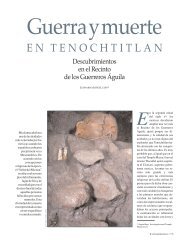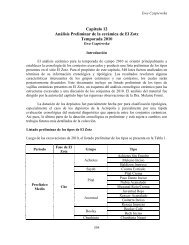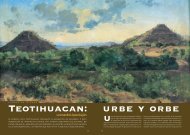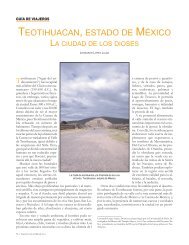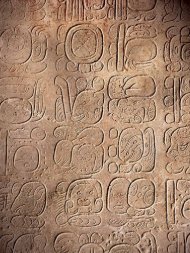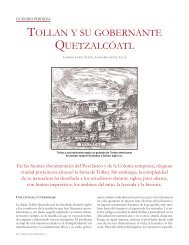- Page 1 and 2: Mesoweb Publications POPOL VUH Sacr
- Page 3 and 4: modern usage were invaluable. I pur
- Page 5 and 6: aqän us (mosquito legs) who was vi
- Page 7 and 8: The word he used was k'astajisaj, m
- Page 9 and 10: origin, transforming the poet into
- Page 11 and 12: the Indians from their former relig
- Page 13 and 14: Maya such that few are literate in
- Page 15 and 16: text that have been published. In t
- Page 17 and 18: newcomers, led by the Cavec-Quiché
- Page 19 and 20: Cavec Quiché lineage that produced
- Page 21 and 22: As outlined in the text, the Quich
- Page 23 and 24: Precolumbian Popol Vuh: In the prea
- Page 25 and 26: Popol Vuh was based as an ilb'al, m
- Page 27 and 28: missionaries. During the early deca
- Page 29 and 30: History of the Popol Vuh Manuscript
- Page 31 and 32: had long since eclipsed Santa Cruz
- Page 33 and 34: script arranged in two columns, Qui
- Page 35 and 36: properly read apart from the litera
- Page 37 and 38: 7. Epithetic Parallelism: The assoc
- Page 39 and 40: Masker, K'ojaj, Sun Lord, K'enech A
- Page 41 and 42: Merely shaped they are called. Xa b
- Page 43 and 44: Come here then my work, Sa'j la rec
- Page 45: Orthography: The Quiché version of
- Page 49 and 50: throat is closed and air forcefully
- Page 51 and 52: Here we shall gather the manifestat
- Page 53 and 54: These collectively are evoked and g
- Page 55 and 56: Shelterer, 29 Twice Midwife and Twi
- Page 57 and 58: sides, 40 as it is said, by the Fra
- Page 59 and 60: Quetzal Serpent. In their essence,
- Page 61 and 62: “How shall it be sown? When shall
- Page 63 and 64: sky was set apart. The earth also w
- Page 65 and 66: Heart of Sky and Heart of Earth, Fr
- Page 67 and 68: Then was the framing, the making of
- Page 69 and 70: it be sown. May it dawn so that we
- Page 71 and 72: If this is to be the provider and t
- Page 73 and 74: who had given them birth and given
- Page 75 and 76: Thus they caused the face of the ea
- Page 77 and 78: Then spoke also their griddles and
- Page 79 and 80: “I am great. I dwell above the he
- Page 81 and 82: 161 Yiqoxik is literally “to be s
- Page 83 and 84: Zipacna was he that sustained the g
- Page 85 and 86: pellet straight from his blowgun in
- Page 87 and 88: “They are not, thou lord. These a
- Page 89 and 90: THE DEEDS OF ZIPACNA AND THE FOUR H
- Page 91 and 92: “How far are you into it?” he w
- Page 93 and 94: On the third day, they started in o
- Page 95 and 96: “Please take pity on me. I will n
- Page 97 and 98:
It was simply because of Hunahpu an
- Page 99 and 100:
Then the boys used a twist drill to
- Page 101 and 102:
and Xbalanque. But we shall tell on
- Page 103 and 104:
Now it was on the path leading to X
- Page 105 and 106:
These, then, are they whose names a
- Page 107 and 108:
These messengers were the owls 249
- Page 109 and 110:
THE DESCENT OF ONE HUNAHPU AND SEVE
- Page 111 and 112:
Thus the Xibalbans laughed again. T
- Page 113 and 114:
Thus there are many trials in Xibal
- Page 115 and 116:
Thus they restricted themselves. Al
- Page 117 and 118:
“Thus may it be so, as I have don
- Page 119 and 120:
man.” 283 “Who is responsible f
- Page 121 and 122:
Thus she collected the sap, the sec
- Page 123 and 124:
“From where have you come? Do my
- Page 125 and 126:
Thus she called upon the guardians
- Page 127 and 128:
Thus she went to see the maize plan
- Page 129 and 130:
Thus they were ignored 327 by Hunah
- Page 131 and 132:
“Our birds do not fall down here.
- Page 133 and 134:
THE FALL OF ONE BATZ AND ONE CHOUEN
- Page 135 and 136:
“We tried, our grandmother, and a
- Page 137 and 138:
Then they gave instructions to an a
- Page 139 and 140:
The first of these were the puma an
- Page 141 and 142:
Straightaway you will go up to wher
- Page 143 and 144:
Immediately then they sealed it, an
- Page 145 and 146:
“Very well then, but I see that y
- Page 147 and 148:
“Tell it then,” they said to th
- Page 149 and 150:
Thus Hunahpu planted one, and Xbala
- Page 151 and 152:
“What, Skull Staff? What is it?
- Page 153 and 154:
Thus they entered first into the Ho
- Page 155 and 156:
Thus the Xibalbans threw down their
- Page 157 and 158:
“Look after our flowers with all
- Page 159 and 160:
HUNAHPU AND XBALANQUE IN THE HOUSE
- Page 161 and 162:
Thus they pleaded for wisdom all th
- Page 163 and 164:
“Fine,” replied the Grandfather
- Page 165 and 166:
Thus the twins were able to retriev
- Page 167 and 168:
“You will then reply, ‘Certainl
- Page 169 and 170:
THE RESURRECTION OF HUNAHPU AND XBA
- Page 171 and 172:
to be prodded because they just wal
- Page 173 and 174:
“Now kill a person. Sacrifice him
- Page 175 and 176:
And then they declared their names.
- Page 177 and 178:
called masters of harm 441 and vexa
- Page 179 and 180:
then little more was said. He did n
- Page 181 and 182:
THESE were the names of the animals
- Page 183 and 184:
called Paxil and Cayala came the sw
- Page 185 and 186:
THE MIRACULOUS VISION OF THE FIRST
- Page 187 and 188:
to move about. We know much, for we
- Page 189 and 190:
eginning. 495 Thus were the framing
- Page 191 and 192:
The beginning of the Tamub and the
- Page 193 and 194:
Uchabahas 517 and the Ah Chumilahas
- Page 195 and 196:
of Sky, Heart of Earth. May our sig
- Page 197 and 198:
THE ARRIVAL AT TULAN 546 THIS, then
- Page 199 and 200:
Nicacah Tacah 554 was the name of t
- Page 201 and 202:
their fire came to nought. Then Bal
- Page 203 and 204:
THE NATIONS ARE DECEIVED INTO OFFER
- Page 205 and 206:
Now when they came from Tulan Zuyva
- Page 207 and 208:
mountain today is called Chi Pixab.
- Page 209 and 210:
Mahucutah, who observed a great fas
- Page 211 and 212:
came to be. Hacavitz it was called.
- Page 213 and 214:
But these, the gods, were comforted
- Page 215 and 216:
the Cakchiquels, the Ah Tziquinahas
- Page 217 and 218:
This they sang concerning the blood
- Page 219 and 220:
them. They gave thanks before them
- Page 221 and 222:
They did the same before the deersk
- Page 223 and 224:
“Conquer many lands. This is your
- Page 225 and 226:
There was a river where they would
- Page 227 and 228:
our hearts that they have come unto
- Page 229 and 230:
of Tohil. Thus said Tohil, Auilix,
- Page 231 and 232:
For the lords felt it was the sign
- Page 233 and 234:
THE NATIONS ARE HUMILIATED 656 THUS
- Page 235 and 236:
mere carved wood with the precious
- Page 237 and 238:
Thus they became disoriented 668 be
- Page 239 and 240:
Balam Acab of the Nihaibs also had
- Page 241 and 242:
disappearance clear when they vanis
- Page 243 and 244:
their lordship. Thus they received
- Page 245 and 246:
THE MIGRATIONS OF THE QUICHÉS 705
- Page 247 and 248:
Then they investigated the mountain
- Page 249 and 250:
There were only two swollen 722 gre
- Page 251 and 252:
And yet again they began to feast a
- Page 253 and 254:
with one another and split apart. T
- Page 255 and 256:
Councilor of the Stacks; 744 Emissa
- Page 257 and 258:
Lord Emissary; 760 Great Lord Stewa
- Page 259 and 260:
Cucumatz became a truly enchanted l
- Page 261 and 262:
name of the other. These accomplish
- Page 263 and 264:
arrows that were the means of shatt
- Page 265 and 266:
Along with Ah Cabracan, 797 Chabi C
- Page 267 and 268:
united. 811 The Tamub and the Iloca
- Page 269 and 270:
Nihaibs. 822 Auilix was the name of
- Page 271 and 272:
of Tohil, as well as before the fac
- Page 273 and 274:
you place them on green roads and o
- Page 275 and 276:
Nor was it merely a few of the nati
- Page 277 and 278:
Tecum 851 and Tepepul were the nint
- Page 279 and 280:
Tecum 860 and Tepepul 861 paid trib
- Page 281 and 282:
THE GREAT HOUSES OF THE CAVEC LORDS
- Page 283 and 284:
THE DYNASTY OF NIHAIB LORDS 869 THE
- Page 285 and 286:
THE DYNASTY OF AHAU QUICHÉ LORDS 8
- Page 287:
But this is the essence of the Quic



